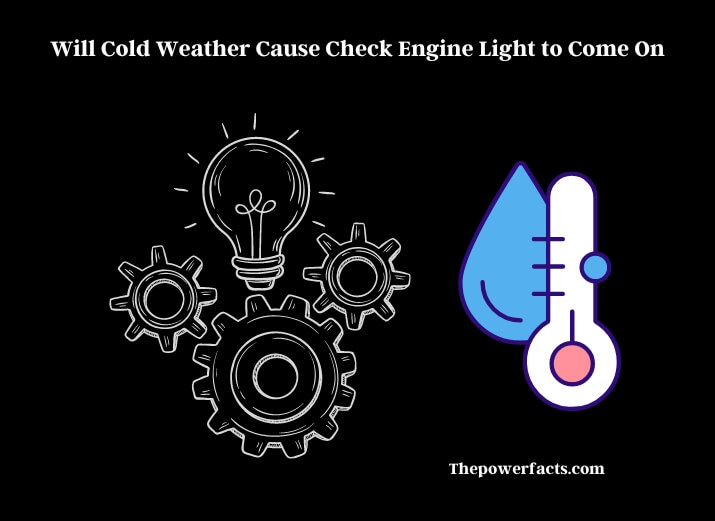We’ve all been there: it’s a freezing cold morning, and as you start your car, the dreaded check engine light comes on. You might wonder, can cold weather cause the check engine light to come on? The answer is yes, cold weather can indeed have an impact on your vehicle’s systems, leading to the illumination of the check engine light. In this article, we’ll discuss the various ways cold weather can affect your vehicle, common issues that might trigger the check engine light, and how to prevent these problems.

The Impact of Cold Weather on Your Vehicle
Cold weather can cause a range of problems for your vehicle, affecting various systems and components. Here are some of the most affected parts:
Engine Oil
Engine oil thickens when the temperature drops, making it harder for the engine to circulate the oil properly. This can lead to increased wear and tear on engine components, as well as reduced efficiency.
Battery
Cold temperatures can greatly reduce a battery’s capacity, making it harder for the vehicle to start. Additionally, the increased electrical demand from heating systems can further strain the battery.
Fuel System
Cold weather can cause condensation to form inside the fuel system, potentially leading to frozen fuel lines or moisture in the fuel itself. This can make it difficult for the engine to start and run smoothly.
Emissions System
The emissions system, which is responsible for controlling the release of pollutants, can also be affected by cold weather. Components such as the oxygen sensor and the catalytic converter may struggle to function properly in colder conditions.
Common Cold-Weather Issues That Can Trigger Check Engine Light
There are several issues that can arise due to cold weather and trigger the check engine light. Some common problems include:
O2 Sensor
The oxygen (O2) sensor measures the amount of oxygen in the exhaust, helping the engine control module (ECM) adjust the fuel mixture for optimal efficiency. Cold weather can cause the O2 sensor to malfunction, sending incorrect readings to the ECM.
Mass Air Flow Sensor
The mass air flow (MAF) sensor measures the amount of air entering the engine, which helps the ECM determine the proper fuel mixture. Cold air is denser than warm air, and the MAF sensor can sometimes struggle to accurately read the increased airflow, leading to a check engine light.
Fuel Pump
As mentioned earlier, cold weather can lead to moisture in the fuel system. This moisture can cause the fuel pump to work harder or even freeze, triggering a check engine light.
Throttle Body
The throttle body controls the amount of air entering the engine. In cold weather, the throttle body may become stuck or struggle to function properly due to ice or dirt buildup, resulting in a check engine light.
Ignition System
Cold weather can also impact the ignition system, causing spark plugs to wear out faster or struggle to ignite the fuel-air mixture. This can lead to misfires, reduced engine performance, and the illumination of the check engine light.
How to Prevent Cold-Weather Related Issues
While cold weather can certainly cause problems for your vehicle, there are steps you can take to minimize the risk of triggering the check engine light:
Proper Maintenance
Regular vehicle maintenance, including oil changes, battery checks, and fuel system inspections, can help you stay ahead of potential issues before they become severe. Make sure to follow your manufacturer’s recommended maintenance schedule.
Winter-Grade Fluids
Using winter-grade fluids, such as engine oil with a lower viscosity and windshield washer fluid designed for colder temperatures, can help your vehicle perform better in cold weather.
Investing in a Block Heater
A block heater warms the engine and oil before you start your vehicle, making it easier for the engine to circulate oil and reducing the risk of cold-related issues. This can be especially helpful in regions with extremely low temperatures.
Conclusion
Cold weather can indeed cause the check engine light to come on. Various systems and components in your vehicle can be affected by cold temperatures, leading to potential issues that can trigger the check engine light. To prevent these problems, it’s essential to keep up with regular maintenance, use winter-grade fluids, and consider investing in a block heater if you live in a region with harsh winters. By taking these steps, you can minimize the risk of cold-related issues and keep your vehicle running smoothly, no matter the temperature outside.
FAQs
Can the check engine light come on due to cold weather alone?
Yes, cold weather can cause a variety of issues in your vehicle that can lead to the illumination of the check engine light.
What are some common cold-weather issues that can trigger the check engine light?
Common issues include malfunctioning O2 sensors, mass air flow sensors, fuel pumps, throttle bodies, and ignition systems.
How can I prevent cold-weather related issues in my vehicle?
Regular maintenance, using winter-grade fluids, and investing in a block heater can help minimize the risk of cold-related problems.
Will the check engine light turn off once the weather warms up?
While some cold-related issues may resolve themselves when the weather warms up, it’s essential to address any problems that triggered the check engine light to ensure your vehicle is functioning correctly.